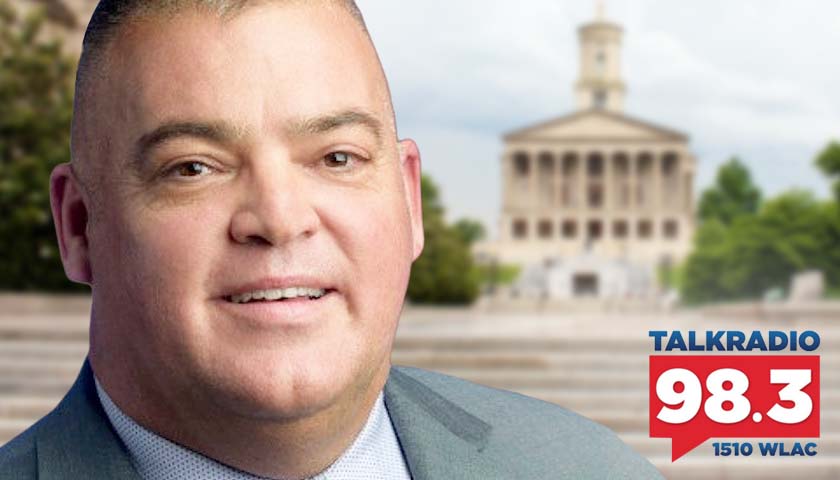Live from Music Row Wednesday morning on The Tennessee Star Report with Michael Patrick Leahy – broadcast on Nashville’s Talk Radio 98.3 and 1510 WLAC weekdays from 5:00 a.m. to 8:00 a.m. – host Leahy welcomed State Representative Todd Warner (R-TN-92) to the newsmaker line to discuss his background and thoughts about the large state budget increase over last year and it’s usage.
Leahy: We are joined now on our newsmaker line by State Representative Todd Warner of Lewisburg in Marshall County. Good morning, Representative Warner.
Warner: Good morning, sir. Good morning, Nashville.
Leahy: We’re delighted to have you on the program. This is your first term in the Tennessee House of Representatives, is that right?
Warner: Yes, sir.
Leahy: What’s your big agenda in the Tennessee General Assembly? Have you introduced some bills? What’s your priority?
Warner: I have a few. Last year I had a Firearm Protection Act bill that I got passed through that I was proud to get done. Basically, what that bill does, it says that here in Tennessee, if the federal government wants to come and, let’s say, seize some AR-15s, that we here in the state of Tennessee are not going to help them.
If they’re going to try to do that, they’re going to have to do it themselves. We’re not going to use any resources of taxpayers in Tennessee to do that.
Leahy: That was one of your bills. What are the other focuses of your agenda for this session?
Warner: I have a veterans bill, which allows veterans to retrieve their retirement credit when they were in the military. So basically, what this bill would do, let’s say, if we have a veteran and he has 21 years in the Tennessee Highway Patrol and he wants to retire at 21 [years], he can go back and retrieve those four years that he spent in the military.
Leahy: I think I need to make a correction. You are actually from Chapel Hill.
Warner: Yes sir.
Leahy: Chapel Hill, in the northern part of Marshall County, but your district office is in Lewisburg. You know the answer to this question; for the history buffs out there, what famous Civil War general was born in Chapel Hill?
Warner: Nathan Bedford Forrest.
Leahy: Yes, exactly. And we did a story about him. After the Civil War, he was buried in Memphis. Big controversy there. I think they’ve reinterred him not too far from Chapel Hill in Maury County. Is that right?
Warner: Yes, over in Columbia. Yes, that is correct. His boyhood home is not far from where I live there. Matter of fact, my brother’s farm joins it, and it’s pretty. If you have never been out there, it’s pretty interesting to go out there and see it.
Leahy: It is interesting. I did drop by there once and took a look at it. Now tell us a little bit about your background. And you grew up in Chapel Hill. Where did you go to high school? What do you do for a living?
Warner: I grew up there in Chapel Hill. I grew up on a dairy farm. I’m the oldest of five boys, and we milked about 150 head of Holstein cows twice a day growing up.
Leahy: What time did you get up in the morning to do that?
Warner: It was early. We usually rolled out of bed there about 3:30.
Leah: Yes, I can relate.
Warner: We didn’t mess around.
Leahy: I grew up in a little dairy farming town in upstate New York. My dad was a teacher, so I didn’t have to get up, but several of my friends would have to get up at 3:30, milk the cows, come to school, play sports, go back, milk again. Oh, my goodness. What a lot of work that is.
Warner: Yes. Seven days a week. I went to Forrest High School there, graduated Forrest High School.
Leahy: And what do you do for a living now?
Warner: I own a small construction company. I do site work and utilities, and we also farm about 800 acres of corn and soybeans.
Leahy: Really? What’s farming like these days?
Warner: It’s tough. It’s tough right now. Chemicals are going to be really hard to get this spring. Fertilizer that has gone out the roof, so I don’t know what’s going to be. There’s a shortage of Roundup. It’s going to be tough this spring.
Leahy: So you chose to just grow corn and soybeans and you don’t have cattle?
Warner: No cows.
Leahy: Why did you choose just to do corn and soybeans as opposed to cattle and dairy cows?
Warner: The dairy industry, they run the small farmer out and it’s just tough. It’s really tough. Most of the dairy farms you see anymore, or these what I call mega-farms or whatnot, they’ll have a thousand, 2,000 heads they’re milking in these factory farms.
Leahy: I know where you speak because, in my family history, my great-great-grandfather came from Ireland. He had a 100-acre dairy farm in Hemmingford, Quebec, from 1840 to 1950 in our family.
And they had, I don’t know, 20 cows, 25. They made their cash money by selling cream to a dairy. When the dairy shut down, they had to close down the farm. So I can relate to that. Crom has a question for you.
Carmichael: I’m curious. When you were in the dairy business before, was the quality of the milk different and better than the factory dairy stuff that comes out today?
Warner: Yeah, I’d want to think it was.
Carmichael: And I’m curious, why is that?
Warner: I don’t know. Maybe the different types of feed that they feed today … .
Carmichael: Because I think that the factory farms are trying to maximize the milk from each cow.
Warner: They are.
Carmichael: And they might end up feeding the cow something or injecting the cow with something to produce more milk, that might make the milk less healthy.
Warner: Right.
Leahy: Let me ask you this. How has redistricting shaped your district? Currently, you represent District 92. That’s all of Marshall County, part of Franklin, Lincoln, and Marion counties. What’s your new district going to be like?
Warner: My new district is coming north. I’m going to catch the Williamson County part of Spring Hill, I’m going to come across the south of Thompson Station Road in south Williamson County. It’s part of Representative Casada and Representative Sam Winston’s district. I’m getting a portion of each one of their districts.
Leahy: Representative Warner, there’s a reason I ask that question. Because about two weeks ago, I got a mailer from State Representative Todd Warner talking about his reelection campaign.
Warner: Are you down in my district?
Leahy: Apparently, I am! (Laughter) At least you sent me a mailer.
Warner: I’m asking for your vote right now. (Carmichael bellows)
Leahy: There’s a man who knows how to close the deal.
Warner: Yeah, that’s great. I’m glad to hear that.
Leahy: We’ve got a story at The Tennessee Star. I don’t know if I’m in your district or not, but you guys probably ran the computer numbers and probably ran my precinct. So my guess is probably, but I haven’t double-checked, but there is a website you can go to at Tennesseestar.com. We’ve got a story there. There’s a new online dashboard. You can plug in your address and see what district. I haven’t done that yet, but I will after the show to see if I’m in your new district.
Warner: I’m asking for your vote right now if you’re in my district. (Leahy laughs)
Carmichael: Representative, we had somebody from the state Senate within the last week talking about the budget that the governor has proposed that’s a huge increase in one year over the next. What are your thoughts on that, and not just your own personal thoughts, but what do you think will happen?
Warner: I don’t know. I’m hearing some rumbling up there. I’m not going to joke about it. It’s an increase. And I don’t know. That’s a tough one right there. I know he’s throwing a lot of money into education, and I’m all for that. But it gets to the point we got to start getting some results.
Leahy: So it puts you in a little bit of a tough spot, because I guess last year’s budget was like $41 billion. This year’s proposal, according to State Senator Mark Pody, is $52 billion. It’s like a 25 percent increase in one year.
For a fiscal conservative like you in a state where the governor is a Republican when he introduces such a large increase, it puts you in a little bit of a tough spot, doesn’t it?
Warner: It does. It is a tough spot. I don’t know. It’s going to be interesting to see how it goes. I’m sure it’ll be whittled down some, but we’ll have to see where things fall.
Carmichael: I’d be really interested if you’d come back on here in the next 60 days or next month, actually, Id be interested to know how much of the budget, I know a lot of it comes because the federal government is giving the state of Tennessee a lot more money.
And I’m wondering whether or not it’s one-time spending or whether or not the new baseline for spending in future years will be whatever is passed this year. Because federal spending is just completely out of control.
And I’m guessing that if there’s a change in Washington, these giant billions and billions of dollars going out to the states will go down.
Warner: They’re going to stop.
Carmichael: Is a lot of the federal money for ongoing programs or is it one-time money?
Warner: I’m not really for sure on that. I would think it would be some one-time money. What bothers me is the reoccurring costs that we’re putting into the budget, if this federal money is one-time money.
Leahy: Good point. Will you come in studio sometime and chat with us a little bit more?
Warner: I would love to. Next time I’ll come in-studio.
– – –
Tune in weekdays from 5:00 – 8:00 a.m. to The Tennessee Star Report with Michael Patrick Leahy on Talk Radio 98.3 FM WLAC 1510. Listen online at iHeart Radio.





